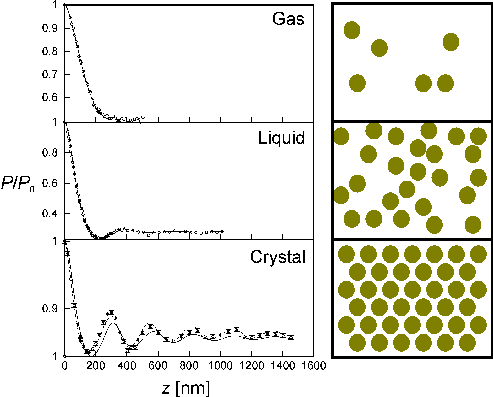Colloidal phase diagram studied by SESANS
Suspensions of hard-sphere colloids are characterised in three phases . The sample consists of sterically stabilised silica spheres with a diameter of 300 nm in deuterated cyclohexane. At dilute concentrations a gas-like phase is formed, in which there is no visible interaction between the particles, as can be seen in the figure. The SESANS measurement shows the autocorrelation function of the spheres, which saturates at spin-echo lengths greater than the diameter of the particles. At intermediate concentrations the colloidal particles feel each other, and the SESANS signal shows a dip corresponding to the hard-sphere repulsion. At slightly higher spin-echo lengths the distance corresponds to the nearest neighbour distance. At the maximum volume fraction a crystal is formed, and then we see the distances in the lattice directly. The cartoons inserted in the graphs give a graphical representation of the colloidal structures corresponding to the SESANS-measurements. Other techniques cannot provide this direct interpretation.

Structural transitions of hard-sphere colloids studied by spin-echo small-angle neutron scattering, T.Krouglov, W.G. Bouwman, J. Plomp, M.Th. Rekveldt, G.J. Vroege, A.V. Petukhov and D.M.E. Thies-Weesie, J. Appl. Cryst. 36, 1417-1423 (2003), http://dx.doi.org/10.1107/S0021889803021216